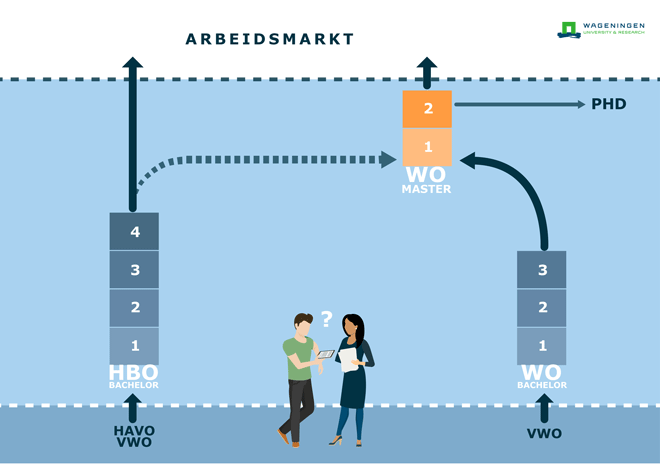What is a minor? What is the benefit?
Parents frequently pose very good questions at parent-teacher conferences about academic programmes and studying. For example, a father asked: “ What is a minor, actually? ” It’s great when parents ask questions. They can be sent through the reaction form below or you can email me… (in Dutch, in het Nederlands)

What is a minor? What is the benefit for students?
What is a minor?
The question didn’t come out of the blue. At parent-teacher conferences I go into the Bachelor-Master system and how everything works when it comes to credits in some detail. After I had explained a number of things this good question was asked. I will take you along to an imaginary parent-teacher conference at a high school. First, I will explain the Bachelor-Master system. Then I will deal with the question: What is a minor?
Bachelor-Master
If your son or daughter is at the havo or the vwo then he or she can pursue a hbo (university for applied sciences) Bachelor’s programme. This is a four-year Bachelor’s programme. Each year you acquire 60 credits. After these four years you can enter the labour market. You have practical and theoretical knowledge (left column on the slide). There is also a more theoretical Bachelor’s programme of three years (right column). For this you need to have done vwo. This is the first part of your university programme. Here as well you earn 60 credits per year. Following your university Bachelor’s, in principle you go on to pursue a university Master’s programme. The university Bachelor’s programme is on a broad basis; during your Master’s degree you pursue an internship and write your thesis. After that your university education is complete. A Master’s programme lasts 1, 2 or 3 years depending on the subject you choose. Again, you earn 60 credits each year.
And a minor is?
A Bachelor’s or Master’s programme comprehends a specific subject: business administration, mathematics, information technology, communication, etc. This is the main subject of the programme. In addition you have a secondary subject; that is the minor. During their Bachelor’s studies the student earns a portion of their credits through their minor. Suppose your son or daughter studies business administration but also finds communication meaningful and interesting. A part of the Bachelor’s programme can be devoted to courses related to communication. Usually this will take up nearly half a year of the three or four years spent on your Bachelor’s studies.
A minor at another institution
You can also pursue a minor at another institution. Sometimes students do their minors at a foreign university or college. In that way they also gain international experience. HBO students can also pursue a minor to prepare themselves for a university Master’s programme. That makes switching from HBO to university that much easier. Students who will pursue a university Bachelor’s programme also use their minor as preparation for their Master’s. That is especially helpful if the student will go on to pursue a different Master’s than usual after the Bachelor’s programme he completed.
Broadening
I have answered your question: What is a minor? But I haven’t yet gone into the goal of the minor. Minors are offered to students to give them the chance to develop more broadly. Society is changing rapidly and it is important that highly-educated people possess a broad knowledge base.
Back to the example: if your child studies business administration but he or she has a knowledge of communication, then it is naturally much easier to change professions or specialisations if necessary. Then your child is a business administrator with knowledge of communication or a communication specialist with knowledge of business administration. Students who develop themselves broadly do well in the labour market. Sometimes there are minors with a fixed programme; sometimes a student can assemble their own course package. You can also follow two masters simultaneously with the same goal.

If your son or daughter is at the havo or the vwo then he or she can pursue a hbo (university for applied sciences) Bachelor’s programme. This is a four-year Bachelor’s programme. After these four years you can enter the labour market. You have practical and theoretical knowledge (left column on the slide). There is also a more theoretical Bachelor’s programme of three years (right column). For this you need to have done vwo. This is the first part of your university programme. Following your university Bachelor’s, in principle you go on to pursue a university Master’s programme.
Deepening
Perhaps you have also encountered the term ‘major’. A major is another term for ‘specialisation’. It is the part of the programme where you as student particularly immerse yourself. Suppose your son or daughter studies business administration. He or she can then choose ‘international business administration’ as their major.
Unique profile
It is wise for a student to develop a ‘unique profile’. A student that has a real specialisation but also broadens his or her knowledge has better chances on the labour market.
Study choices remains important
Even if your son or daughter has chosen a specific programme, choices still need to be made. Making learning choices is really a craft. If your son or daughter learns how to make good choices, then they acquire a skill that will remain useful for their whole lives. After all, you have to make choices over the course and of your entire life.

